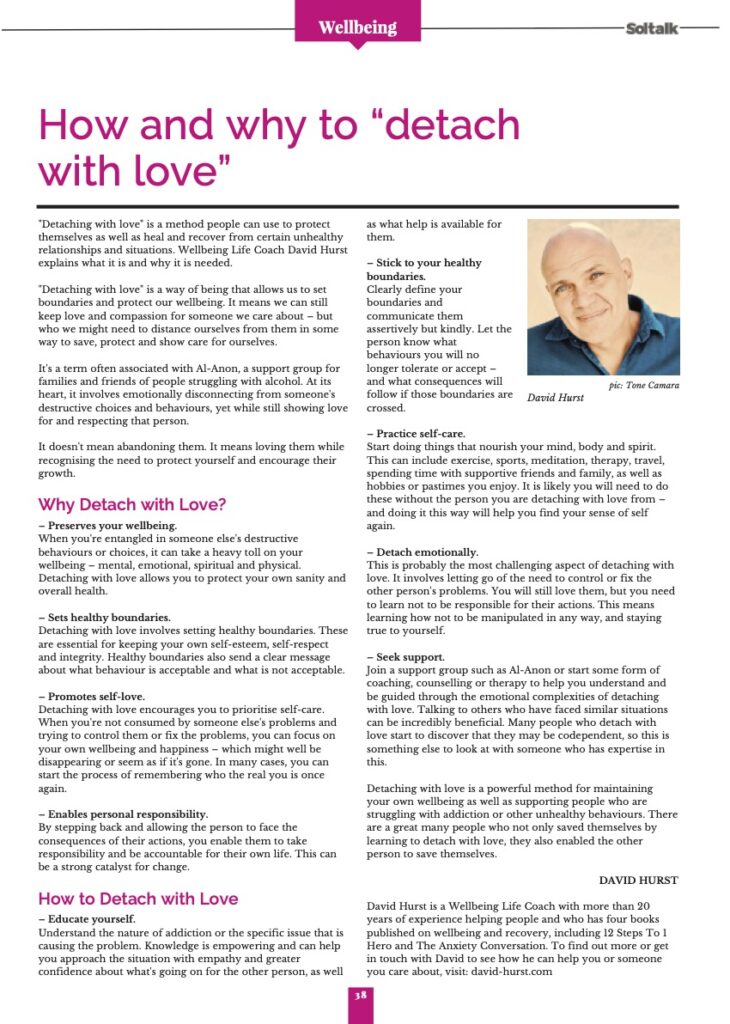How and why to “detach with love”

“Detaching with love” is a method people can use to protect themselves as well as heal and recover from certain unhealthy relationships and situations. It is a way of being that allows us to set boundaries and protect our wellbeing.
It means we can still keep love and compassion for someone we care about – but who we might need to distance ourselves from in some way to save, protect and show care for ourselves.
It’s a term often associated with Al-Anon, a support group for families and friends of people struggling with alcohol. At its heart, it involves emotionally disconnecting from someone’s destructive choices and behaviours, yet while still showing love for and respecting that person.
It doesn’t mean abandoning them. It means loving them while recognising the need to protect yourself and encourage their growth.
Why Detach with Love?
– Preserves your wellbeing.
When you’re entangled in someone else’s destructive behaviours or choices, it can take a heavy toll on your wellbeing – mental, emotional, spiritual and physical. Detaching with love allows you to protect your own sanity and overall health.
– Sets healthy boundaries.
Detaching with love involves setting healthy boundaries. These are essential for keeping your own self-esteem, self-respect and integrity. Healthy boundaries also send a clear message about what behaviour is acceptable and what is not acceptable.
– Promotes self-love.
Detaching with love encourages you to prioritise self-care. When you’re not consumed by someone else’s problems and trying to control them or fix the problems, you can focus on your own wellbeing and happiness – which might well be disappearing or seem as if it’s gone. In many cases, you can start the process of remembering who the real you is once again.
– Enables personal responsibility.
By stepping back and allowing the person to face the consequences of their actions, you enable them to take responsibility and be accountable for their own life. This can be a strong catalyst for change.
How to Detach with Love
– Educate yourself.
Understand the nature of addiction or the specific issue that is causing the problem. Knowledge is empowering and can help you approach the situation with empathy and greater confidence about what’s going on for the other person, as well as what help is available for them.
– Stick to your healthy boundaries.
Clearly define your boundaries and communicate them assertively but kindly. Let the person know what behaviours you will no longer tolerate or accept – and what consequences will follow if those boundaries are crossed.
– Practice self-care.
Start doing things that nourish your mind, body and spirit. This can include exercise, sports, meditation, therapy, travel, spending time with supportive friends and family, as well as hobbies or pastimes you enjoy. It is likely you will need to do these without the person you are detaching with love from – and doing it this way will help you find your sense of self again.
– Detach emotionally.
This is probably the most challenging aspect of detaching with love. It involves letting go of the need to control or fix the other person’s problems. You will still love them, but you need to learn not to be responsible for their actions. This means learning how not to be manipulated in any way, and staying true to yourself.
– Seek support.
Join a support group such as Al-Anon or start some form of coaching, counselling or therapy to help you understand and be guided through the emotional complexities of detaching with love. Talking to others who have faced similar situations can be incredibly beneficial. Many people who detach with love start to discover that they may be codependent, so this is something else to look at with someone who has expertise in this.
Detaching with love is a powerful method for maintaining your own wellbeing as well as supporting people who are struggling with addiction or other unhealthy behaviours. There are a great many people who not only saved themselves by learning to detach with love, they also enabled the other person to save themselves.

My new article for Soltalk magazine.
